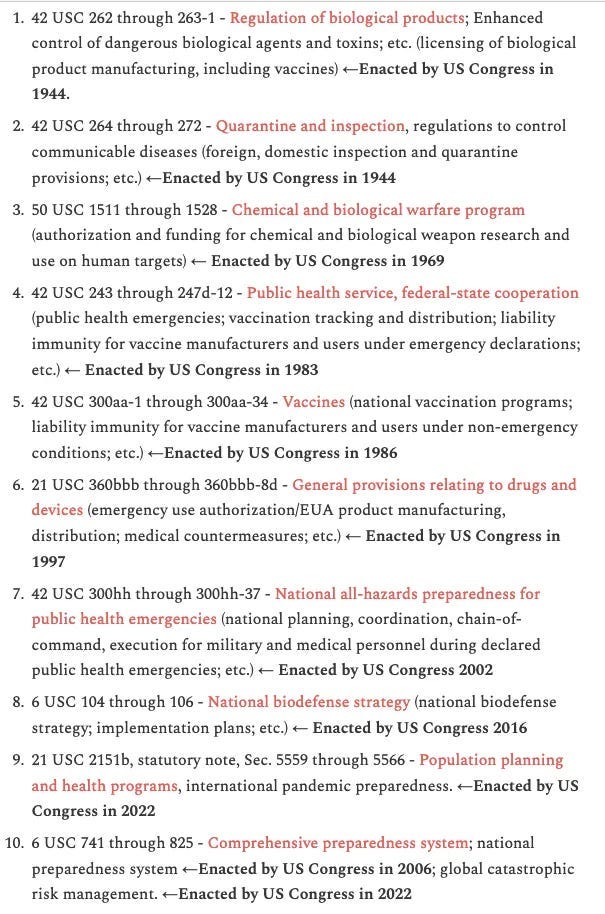Preliminary analysis of Loper v. Raimondo
Congress legalized military and civil administrators overriding US Constitution under self-declared emergency conditions, and Congress can repeal the enabling acts.
Orientation for new readers - American Domestic Bioterrorism Program - Tools for dismantling kill box anti-law
A few readers have asked for my views on the US Supreme Court's recent ruling in Loper Bright Enterprises, et al, v. Raimondo, Secretary of Commerce, et al., as overturning the Chevron v. NRDC (1984) framework (judicial deference to executive agency interpretation of ambiguous statutory law) and applying the Administrative Procedure Act (1946) more fully to judicial review of federal executive agency acts.
From the Loper decision syllabus:
Held: The Administrative Procedure Act requires courts to exercise their independent judgment in deciding whether an agency has acted within its statutory authority, and courts may not defer to an agency interpretation of the law simply because a statute is ambiguous; Chevron is overruled.
Readers asked whether I think the Loper decision overturning Chevron deference will allow for challenges against agency interpretations of public health emergency laws such as the PREP Act.
I've replied by email to a few readers:
In my opinion (pending further review) the Loper decision doesn’t help for PREP Act challenges, because Chevron and Loper are about cases in which Congressional legislative intent is arguably ambiguous.
PREP Act and the other chemical and biological warfare enabling acts are clear and unequivocal (not ambiguous) expressions of Congressional intent to block judicial review, and preempt Congressional authority and state and local authority.
Again, I need to read the Loper decision more carefully to confirm, but that’s my initial response.
I have read the Loper synopsis but not the whole opinion, and I read the synopsis in the light cast by public health emergency laws enacted by Congress and US Presidents (2002 Public Health Security and Bioterrorism Preparedness and Response Act, 2004 Project Bioshield Act, 2005 PREP Act and many more) and in the light cast by SCOTUS' May 2020 decision in South Bay Pentecostal Church v. Newsom, addressing judicial review of federal and state agency acts during declared public health and other national emergencies.
Within that legal context — Congressional acts signed by US presidents, and South Bay Pentecostal v. Newsom — I construe SCOTUS' decision in Loper v. Raimondo as yet another diversionary maneuver, to steer public scrutiny and legal challenges away from the deliberate complicity of Congress, US Presidents and federal judges in the overthrow of the US Constitution and handover of control of the American government to military and public health civil administrators working within the executive branch.
Those civil administrators, exemplified by HHS Secretary Xavier Becerra, Defense Secretary Lloyd Austin and Homeland Security Secretary Alejandro Majorkas (alongside all other cabinet secretaries, deputy secretaries and SES officials) are working for central bankers, United Nations-World Health Organization and related supranational organizations, to conduct fraud-based informational, psychological, biological and chemical war.
Congress members, US Presidents and federal judges have emasculated themselves.
Helping more people understand how and why they've done what they've done, is an important part of challenging Congress and US presidents to reverse the procedure (repeal the enabling acts) and restore constitutional rule of law.
Through the public health emergency laws, Congress and US Presidents have created a legal platform from which, in January 2020, military and civil administrators carried out a coup and assumed semi-overt, semi-covert ruling power in the United States.
Laws enacted by Congress (legislative branch) and signed by US Presidents (executive branch), created triggering "emergency" conditions under which the US Constitution and separation of powers are nullified, and ruling power is automatically concentrated in the hands of the HHS Secretary, Defense Secretary and Homeland Security Secretary (executive branch, military and civil administrative component) upon those secretaries unilaterally and unreviewably declaring that a public health emergency, military emergency, domestic emergency or material threat exists, and extending such declarations in the same unreviewable way.
Key terms Congress and US Presidents have embedded into federal statutory law include "not reviewable" and "committed to agency discretion" which preclude judicial review of agency acts under APA exemptions (5 USC 701(a)(1) and (2))
Four examples:
21 USC 360bbb-3(i), Actions committed to agency discretion. Places all policy and program decisions about "Expanded access to unapproved therapies and diagnostics" — design, manufacturing, labeling, procurement, distribution and use of intentionally toxic 'medical countermeasures' to injure and kill recipients — under the unilateral, unreviewable control of the HHS Secretary and his or her delegates within HHS (FDA, CDC, NIH) in coordination with counterparts in DoD and DHS, through the Public Health Emergency Medical Countermeasures Enterprise (PHEMCE).
42 USC 247d-6d(b)(7), Judicial review. Blocks access to courts for judicial review of the facts or law relating to HHS Secretary public health emergency declarations and medical countermeasures product classifications.
42 USC 247d-6d(b)(8), Preemption of state law. Preempts authority of state, local and tribal governments and individuals to manage public health emergency and medical countermeasures classification and regulation outside of HHS/DOD control.
42 USC 247d-6d(b)(9), Report to Congress. Narrowly limits obligation for HHS to report to Congress on public health emergency status and medical countermeasures classifications, and no authorization for Congress to override HHS declarations, determination, and decisions.
SCOTUS joined Congress and US Presidents, ratifying the emergency-predicated, military and civil administrators’ coup, through its May 2020 decision in South Bay Pentecostal v. Newsom.
April 28, 2023 - Draft discovery materials for civil and criminal cases.
"...Many cases have been dismissed on grounds that the plaintiffs lacked standing to sue alleged government officials and challenge executive acts. Federal courts have accepted — without fact-finding, adversarial evidentiary testing, or legal review — that all the acts undertaken by executives during Covid-19 were and remain legitimate government functions, properly performed.
Judges dismissing these cases have been complying with SCOTUS Chief Justice John Roberts’ illegitimate May 29, 2020 order in South Bay Pentecostal Church v. Newsom.
South Bay Pentecostal is a California case through which Justice Roberts ordered federal judges to stand-down and abdicate their Constitutional review obligations, without engaging in fact-finding or legal analysis of whether “broad limits” on exercise of State power have or have not been “exceeded."
Sasha Latypova and I discussed some of these issues in November 2022.
Nov. 2, 2022 - Sasha Latypova and Katherine Watt discussion on American Domestic Bioterrorism Program. Transcript by Dave Ratcliff at Ratical.org.
...Sasha Latypova:
What was the earliest relevant piece of law that you can trace that was changed in particular for this plandemic to occur?
Katherine Watt:
I think the earliest one was the 1983 establishment of the Public Health Emergencies Program under the rubric of the Public Health Services Act, which was a 1944 law. But when Reagan and the Congress at the time put in the Public Health Emergencies section, that was the beginning of concentrating much, much more power in the hands of the Health and Human Services Secretary, whenever a public health emergency has been declared by the HHS Secretary.
So it’s a completely closed loop of, once they declare it, they have all the power, and they are the only one who can suspend their power because of the way they wrote the laws, to the extent — let’s say — to the extent that federal judges and Congress accept the premise that the executive branch can shut them out of everything after the announcement has been made...
...it gets into the amazing structural features Congress built into these things where Congress not only put all the power into the HHS secretary’s hand. They also eliminated their own oversight power.
They eliminated, or they claimed to — this is written in the laws — they claimed that they have no power to overrule or review his emergency declarations about the existing emergency. They can’t overrule his EUA declarations.
They also put provisions that no federal judge can review those declarations. Once they’re made, they’re considered solely within agency discretion. So there’s no judicial review and [Congress] eliminated states' power to take any course of action different from what the HHS secretary has said that they should do, which is called preemption.
There’s sections in these laws that make it so that there is no state authority to overrule HHS secretary, there is no congressional authority to overrule HHS secretary, and there is no judicial authority.
And Congress did that.
Which raises the interesting, super interesting philosophical question of —with horrible implications — how did they give away a power that they didn’t have the power to give away?
Congress does not have the power to dissolve itself.
Congress does not have the power to dissolve the federal judiciary under the U.S. Constitution.
But they did it to the extent that the federal judges are deferring to them. And Congress is deferring to the HHS secretary.
And the states...are deferring and not challenging these things. They’re just saying, "Whoop, that happened."...
You can’t give away a power that wasn’t yours to give away to begin with. And the power in our country is supposed to be in the Constitution, the supreme law of the land. There’s supposed to be nobody that’s above it.
So to have Congress say, "Well, you know, never mind," is just super bizarre.
Pray the Rosary.
Related:
June 8, 2021 - Courts, judges, constitutions, lawsuits and evidence are no longer a plausible bulwark against tyranny.
April 7, 2022 - Re: “judicially-unreviewable.”
Nov. 14, 2023 - Separation of powers, reservation of powers (federalism), and the PREP Act.
Jan. 15, 2024 - Interview with Peter and Ginger Breggin
"What's being presented as a public health emergency, and as a pharmaceutical product, is actually not either of those things.
It's really a constitutional crisis. And it's been a constitutional crisis since long before it sort-of emerged on the scene in the beginning of 2020. Because the constitutional crisis is based in changes in US law that make it possible for the federal government to carry out biological attacks on the population, through the states, through biological products, like vaccines, and through emergency conditions and emergency orders, like the ones that came out during Covid.
Because really, what they're trying to do is injure and kill a lot of people here and around the world without getting caught, without getting stopped, without people seeing that that's what it is.
And what their overarching goal is to do is to concentrate power first in the federal executive branch in the United States, and then pass it over to the United Nations, the World Health Organization and whatever successor globalist organizations and institutions they develop."
May 7, 2024 - Pandemics are fake. Federal and state public health emergency kill box laws can be repealed and nullified.









